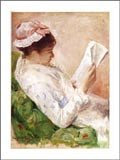skip to main |
skip to sidebar
 The Lake House by Kate Morton
My rating: 4 of 5 stars
The Lake House by Kate Morton
My rating: 4 of 5 stars
Past and present mingle and meet in two English houses. One, a huge and crumbling house on a lake, was where a baby boy disappeared during a gala Midsummer's Eve party in 1933. The other, a small home in Cornwall, is where a widower resides with the tangible and ineffable memories of his beloved wife.
Sadie Sparrow, a metropolitan detective, is visiting her grandfather, on leave from a case she took so personally that the violated protocol: the disappearance of a young mother, who abandoned her baby in a London flat. While taking a long run through a thick forest, she discovers Loeanneth in ruins, and decides to investigate. The locals have long memories and computer files that lead her to the lost baby's elderly sister in London, now a secretive and popular author of a long-running series of mysteries. She decides to allow Sadie to unlock the house, possibly to unlock the unsolved tragedy.
Both houses are presences, especially Loeanneth,which begins to reveal its secrets to the motivated detective and the reclusive writer. Letters, diaries, abandoned manuscripts, and the crumbling artifacts of passions spent lead Sadie deep into the secrets of a once-vibrant family, broken by wars and loss.
Except for the ending, which is a bit too tidy, this book is a splendid two-tiered tale, with homes that become characters in the spirit of Rebecca's Manderley and Howard's End.
4 1/2 stars.
I received an ARC of this book from NetGalley, and this is a fair review.
View all my reviews
 The Hours Count by Jillian Cantor
My rating: 3 of 5 stars
The Hours Count by Jillian Cantor
My rating: 3 of 5 stars
Whatever else you know about Ethel and Julius Rosenberg, one thing is true: they were the parents of two young sons. Julius had already been arrested when Ethel was called to testify before the Grand Jury on 11 August 1950. She was not given so much as a minute to make arrangements for the care of their two young sons when she was arrested immediately after testifying. One minute, she was a proper Jewish housewife and mother, wearing white gloves. The next minute, she was in custody, charged with typing her husband's notes. Whatever else you know, going into this book, realize this: ultimately, she was executed for typing. Not stealing or passing atomic secrets to the Russians. Typing.
The story is told by Millie Stein, a fictional neighbor in the apartment complex where the Rosenbergs last lived. Millie is married to Ed, a brutal Russian Jew, whose indifference to their son (probably autistic, lacking language skills) contrasts cruelly to the love and warmth in the Rosenberg family. Although Millie knows that her husband attends political - probably Communist - meetings, she is shocked to learn that he has known the Rosenbergs for years.
Ed grudgingly allows her to accept an invitation to a party at the Rosenbergs' apartment after she and Ethel become friendly, bonded by their children and shared concerns. Ethel has secretly steered Millie to Planned Parenthood for birth control, which would enrage Ed, who threatens to institutionalize their son unless she has another, "normal" child. Millie has kept secrets for Ethel to protect her privacy in the neighborhood.
Secrets are in the air at the party, where spying, lying, and politics are discussed by partygoers, including David Greenglass (Ethel's brother), his wife Ruth, and Morton Sobel, all of whom figure in the betrayal and death of the Rosenbergs. Millie also meets another (fictional) character there, a psychologist named Jake, whose promise to help her son develop language skills leads her down yet another dangerous, secret path.
Since the events that lead to the arrests, trials, and executions are only glimpsed by Millie, it can be frustrating to pick them out of the narrative. Both her husband and the therapist advance the plot without significantly enlightening the reader, since each has his own agenda, and the reader is as bewildered as Millie. Some of those glimpses are so ordinary, yet so meaningful - Julius playing with his son in the park, Ethel cooking a chicken. Others, just as true, are horrific, such as the government agents scooping evidence out of the apartment as Ethel pleads with them to spare the recording she had made of her voice, hoping they would know what she sounded like if she was gone.
Millie's plight as an abused woman who puts her trust in anyone who is kind to her and her son is vivid and heartbreaking, but her moments of clarity and insight into her husband's true business are made less believable by her ignorance of the world. Still, this detailed look at the last free days of the doomed couple is gripping and thought-provoking. The author provides a reading list. I care enough about the disquieting evidence of official malfeasance to learn more.
3 1/2 stars.
I received an ARC of this book from NetGalley; this is a fair review.
View all my reviews
 The Lake House by Kate Morton
The Lake House by Kate Morton

